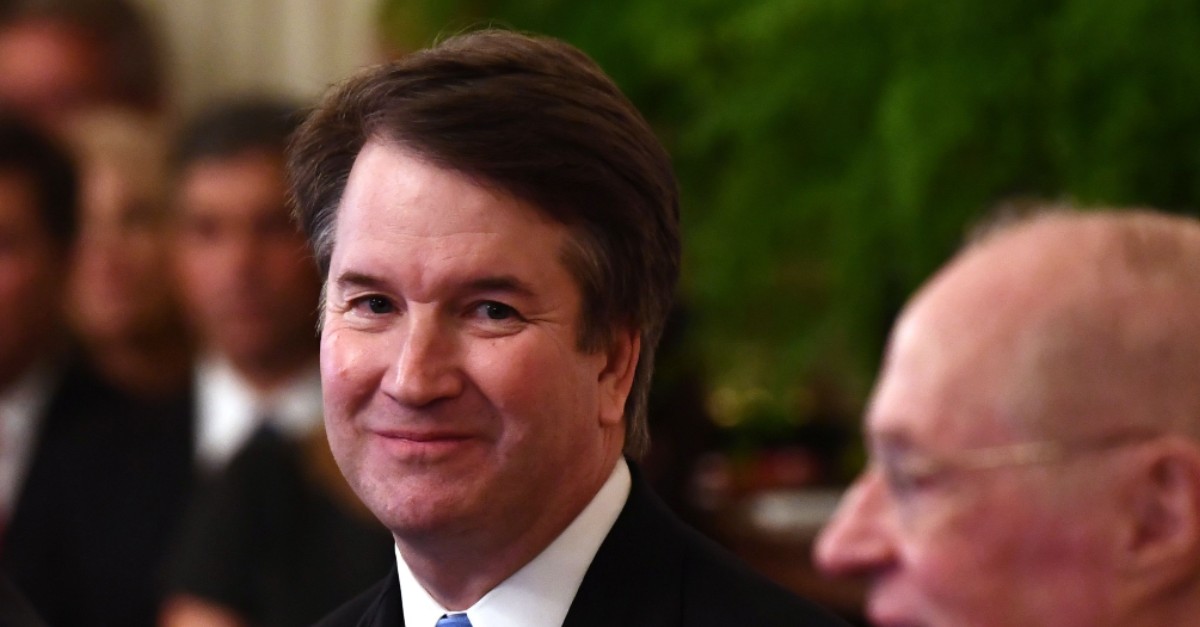OPINION: This article may contain commentary which reflects the author's opinion.
The U.S. Supreme Court heard oral arguments on Wednesday in the most important abortion case in nearly three decades.
The nation’s highest court heard a direct challenge out of Mississippi to Roe v. Wade’s landmark holding that the Constitution provides a right of access to abortion.
Chief Justice John Roberts and Justice Brett Kavanaugh might be the deciding votes on the case.
CNN reported that Roberts and Kavanaugh might be looking at a “middle ground,” where they may not support completely reversing Roe v Wade:
Roberts suggested the court could look at Mississippi’s 15-week law as a new viability standard, rather than Roe and Casey, which is over 20 weeks. And Kavanaugh, meanwhile, has asked to confirm that Mississippi isn’t asking the court to outright prohibit abortion, a way to say it’s not overturning Roe while limiting access.
Kavanaugh asked another set of questions suggesting he is inclined to rule with Mississippi and even go as far as reverse Roe.
In broad strokes, he sums up Mississippi’s argument asking the court to interpret the Constitution as neutral on abortion, and to return the issue to state or Congress. He asked Rikelman to respond.
Then he asked a question about stare decisis, ticking off several “consequential” decisions — including on school segregation, voting rights, and business regulations — where the court overturned precedent.
CNN’s report on Roberts stated:
Roberts, a key swing vote, had questions specifically about Mississippi’s ban, asking Julie Rikelman, a lawyer representing Jackson Women’s Health Organization, the only licensed abortion clinic in the state, why 15 weeks is not enough time for a woman to obtain abortion.
Rikelman said that a “reasonable possibility standard” would be “unworkable” for the courts and that without the viability line, states will push that point earlier and earlier in the pregnancy.
She also pushed back on a claim by Roberts that United States stands out internationally for how late into the pregnancy it allows abortion. She said that many countries – including Canada and several countries in Europe – permit abortion up until viability. She also noted that other countries have fewer regulatory barriers to the procedure.
CNN also noted how Kavanaugh may be open to limiting abortion:
Justice Brett Kavanaugh asked a question that seems aimed at the arguments made by abortion rights advocates that a decision overturning Roe v. Wade would be a step towards the Supreme Court eventually issuing a decision that would outlaw abortion nationwide.
Kavanaugh asked Mississippi Solicitor General Scott Stewart to confirm that his state is not making an argument that the court should prohibit abortion.
Mississippi is arguing that the Constitution is silent or neutral on the abortion question. Kavanaugh asked Stewart to confirm, which he did.
Kavanaugh suggested that a majority of states – or at least many states – would maintain abortion access.
“The Constitution is neither pro-life nor pro-choice … and leaves the issue to the people to resolve in the democratic process,” Kavanaugh said.
Justice Kavanaugh asks why overturning Roe v. Wade would not be in keeping with "the most consequential cases in the country's history" — including those establishing racial equality, Miranda rights, and marriage equality — that all "overruled precedent." pic.twitter.com/gSSomaqHVq
— The Recount (@therecount) December 1, 2021
This question from Amy Coney Barrett is basically game over for Roe. She says: Now that all 50 states have "safe haven" laws that let women relinquish parental rights after birth, the burdens of parenthood discussed in Roe and Casey are irrelevant, and the decisions are obsolete. pic.twitter.com/omyhGISVmN
— Mark Joseph Stern (@mjs_DC) December 1, 2021
In remarks on Tuesday at the National Press Club, former Vice President Mike Pence called the high court’s decision on Roe, which protected a woman’s right to have an abortion, a “misguided” ruling that has harmed millions of unborn children.
“We are asking the Court, in no uncertain terms, to make history. We are asking the Supreme Court of the United States to overturn Roe v. Wade and restore the sanctity of human life to the center of American law,” Pence said.
Pence said the court’s 1973 ruling was a “misguided decision” that has “inflicted a tragedy not only on our nation but on humanity, that is hard to fathom.”
“When the Supreme Court overturns Roe v. Wade — and I believe with all my heart that day will come, either now or in the near future — it will not come as a surprise to anyone,” Pence continued. “It will simply be the culmination of a 50-year journey whose course and destination have been set by the will of the American people.”
